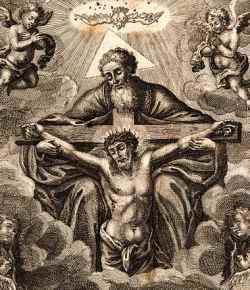The Love of Jesus Christ : Part 9
Download MP3 of The Love Shown to Us By Jesus Christ in His Passion Part 8:The Hope that we have in Jesus Christ that He will grant us Eternal Happiness. (Right Click and Select Save As)
Click To Download the Entire Catholic Audiobook : The Love Shown to us by Jesus in his Passion.
Transcript: The Hope that we have in Jesus Christ that He will grant us Eternal Happiness.
And therefore He is the mediator of the New Testament, that by means of His death . . . they that are called may receive the promise of eternal inheritance? Here St. Paul speaks of the New Testament not as a covenant, but as a promise, or testamentary disposition, by which Jesus Christ left us heirs of the kingdom of heaven. And because a testament is not in force until the death of the testator, therefore it was necessary that Jesus Christ should die, that we might become his heirs, and enter into the possession of paradise. Wherefore the Apostle adds, For where there is a testament, the death of the testator must of necessity come in. For a testament is of force after men are dead; otherwise it is as yet of no strength whilst the testator liveth?
Through the merits of Jesus Christ our mediator we have received grace in baptism to become the sons of God; unlike the Jews, who, under the old covenant, though they were the elect, were yet all servants. Whence the Apostle writes, For there are two covenants, of which one on Mount Sina engendereth to bondage. The first mediation was made with God by Moses on Mount Sina, when God, through Moses, promised to the Jews the abundance of temporal blessings, if they observed the laws which he gave them; but this mediation, says St. Paul, only produced servants, unlike the mediation of Jesus Christ, which produces sons: We, brethren, like Isaac, are the children of promise? If, then, being Christians, we are the sons of God, by consequence, says the Apostle, we are also heirs; for a portion of the father’s inheritance is given to all sons, and this is the inheritance of eternal glory in paradise, which Jesus Christ has merited for us by his death.
St. Paul nevertheless adds, in the same place, If we suffer with Him, we shall also be glorified with Him? It is true that, by our sonship to God, which Jesus Christ has obtained for us by his death, we have acquired a right to paradise; but this is on the supposition that we are faithful to correspond to the divine grace by our good works, and especially by holy patience. Therefore the Apostle says that in order to obtain eternal glory, as Jesus Christ has obtained it, we must suffer upon earth as Jesus Christ suffered. He goes before, as our captain, with his cross; under this standard we must follow him, each bearing his own cross, as the same Lord admonishes us, He that will come after Me, let him deny himself, and take up his cross and follow Me?
St. Paul also exhorts us to suffer with courage, strengthened by the hope of paradise, reminding us that the glory which will be given us in the next life will be infinitely greater than all our sufferings, if we suffer here with good will, in order to fulfil the divine pleasure : reckon that the sufferings of this present time are not worthy to be compared with the glory to come that shall be revealed in us. What beggar would be so foolish as not to give gladly all his rags for a great kingdom? We do not as yet enjoy this glory, because we are not yet saved, not having finished our life in the grace of God; but hope in the merits of Jesus Christ, says St. Paul, will save us: We are saved by hope. 1 He will not fail to give us every help to save us, if we are faithful to him, and continue to pray; and the promise of Jesus Christ assures us that he hears every one who prays: Every one that seeheth, receiveth? Someone will say, I fear, not that God will refuse to hear me, if I pray to him, but I fear for myself, that I should not know how to pray as I ought. No, says St. Paul, fear not this, for when we pray, God himself aids our weakness, and makes us pray so as to be heard. The Spirit helpeth our infirmity, and asketh for us. He asks, explains St. Austin, that is, he helps us to ask. The Apostle would still further increase our confidence; he says, We know that all things work together for good to those that love God.’ By this he teaches us that shame, sickness, poverty, persecutions, are not evils, as men of the world account them; for God turns them all into blessings and glory for those who suffer with patience. Finally, he says, Those whom He foreknew, He also predestinated to be conformed to the image of His Son. G With these words he would persuade us that, if we would be saved, we must resolve to suffer everything rather than lose the divine grace, for no one can be admitted to the glory of the blessed, unless at the day of judgment his life be found conformed to the life of Jesus Christ.
And that sinners may not, through these words, abandon themselves to despair on account of their guilt, St. Paul encourages them to hope for pardon, telling them that for this end the Eternal Father has not spared his own son, who was offered to satisfy for our sins, but gave him up to death, that he might pardon us sinners; and still further to increase the hope of penitent sinners, he says, Who is he that shall condemn ? Is it Jesus Christ who died? as though he had said, Sinners, you who detest your sins, why do you fear to be condemned to hell? Tell me who is your judge, — who is to condemn you? Is it not Jesus Christ? How, then, can you fear that you will be condemned to death by this loving Redeemer, who, that he might not condemn you, has been willing to condemn himself to die as a malefactor upon the infamous gibbet of the cross? He speaks, indeed, of those sinners who, being contrite, have washed their souls in the blood of the Lamb, according to the words of St. John.
My Jesus! If I look at my sins, I am ashamed to seek for paradise, after the many times that I have openly renounced Thee, for the sake of short and miserable pleasures; but looking to Thee upon this cross, I cannot cease to hope for paradise, knowing that Thou hast been willing to die upon this tree to atone for my sins, and to obtain for me this paradise which I had despised. O my sweet Redeemer! I hope, through the merits of Thy death, that Thou hast already pardoned me the sins I have committed against Thee, for which I repent, and now I would rather die for grief of them; and yet, O my God, I see that, with all that Thou hast pardoned me, it will ever be true, that, in my ingratitude, I have had the heart to cause Thee so much displeasure, who hast so much loved me. But what is past is past. At least for the rest of my life, O my Lord, I would love Thee with all my powers; I would live only for Thee; I would be wholly Thine; wholly, wholly, wholly Thine. But Thou must accomplish this. Detach me from every earthly thing, and ( give me light and strength to seek Thee alone, my only good, my love, my all.
O Mary, hope of sinners! thou must help me with thy prayers. Pray, pray for me, and cease not to pray, until thou seest me wholly given to God.
Resources
Saint Alphonsus Ligouri, The Passion and Death of Jesus Christ, Benziger Brothers, 1887, pg 359-364
Image taken from Public Domain here
You may also like:
- The Love Shown to us by Jesus Christ in his Passion: Part 8 The Hope that we have in Jesus Christ that He will grant us Final Perseverance.
- The Love Shown to us by Jesus Christ in his Passion: Part 7 The Hope that We Have in Jesus Christ that He will pardon our sins.
- The Love Shown to us by Jesus Christ in his Passion: Part 6 Jesus Crucified is our only Hope in all our wants.
- The Love Shown to us by Jesus Christ in his Passion: Part 5 What it is to live and die for Jesus?
- The Love Shown to us by Jesus Christ in his Passion: Part 4 Jesus died for us; we ought to live and die for Him.
- The Love Shown to us by Jesus Christ in his Passion: Part 3 Jesus died not only for us all, but for each one of us.
- The Love Shown to us by Jesus Christ in his Passion: Part 2 The Son of God Offered Himself for the Love of Us






